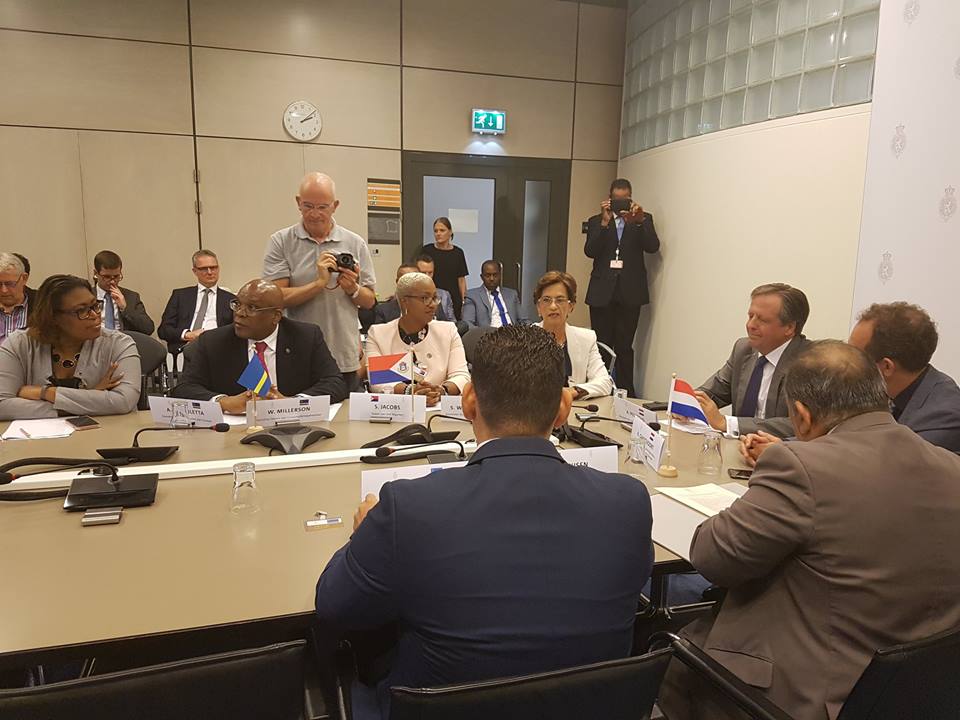
PHILIPSBURG – The dispute regulation and waste processing were two of the main items on the agenda of the Inter-Parliamentary Kingdom Consultation (IPKO) in The Hague. After more than eight years of discussion, the IPKO delegations of the Netherlands, Aruba, Curacao and St. Maarten decided this week to put pressure on the Dutch government to get on with by setting two deadlines: June 18 and November 1.
By June 18, the Dutch Parliament and the Senate want to receive a reaction from State Secretary Raymond Knops to a letter they wrote to him from the IPKO about the dispute regulation. The letter asks Knops to submit a draft law to Parliament by November 1 so that the IPKO can discuss its contents in its next meeting that is scheduled for January 2019 in St. Maarten.
Former Minister Ronald Plasterk (Kingdom Relations) submitted a draft law for the dispute regulation to the Council of State last year. The draft and the advice from the Council of State have not been made public yet, to the displeasure of even the Dutch IPKO-delegation. The advice reportedly contains serious criticism.
The Caribbean countries want a dispute regulation that yields binding advice by an independent body – preferably the Supreme Court – but Plasterk reportedly wants to leave this in the hands of the Council of State. Plasterk also wants to prevent that a dispute regulator issues binding advice, making it clear that the Dutch government wants to remain in control of any dispute between the Kingdom and the Caribbean countries.
Ruard Ganzevoort said at a press conference at the end of the IPKO that all delegations agree that the dispute regulation must be established. That is not new: in May 2015, the IPKO-delegations reached an agreement about the dispute regulation. “I would be disappointed if this took more than a year,” Jeroen Recourt, at that time leader of the Dutch delegation said about the establishment of the regulation. Recourt also noted that “if parliaments speak, governments have to listen.”
The political reality turned out to be different because the Dutch government did not listen at all. Minister Plasterk came with his own draft law, and recently his successor Raymond Knops said that the dispute regulation is not a priority.
That does not sit well with the IPKO-delegations. They decided to send Knops a letter, demanding a reaction by June 18. They also want Knops to submit the draft law for handling in parliament by November 1.
The letter, signed by Senator Ruard Ganzevoort and D66-leader Alexander Pechtold – the chairs of the Kingdom Relations Committees in respectively the First and Second Chamber of the Dutch parliament – notes that many years have gone by without a draft law for the dispute regulation reaching the floor of parliament.
“Furthermore quite some time ago a draft law has been sent to the Council of State for advice. We understand that this advice has in the meantime been obtained. It would benefit progress and mutual relationships if there is transparency as soon as possible about the content, the considerations and the next steps.”
“We have not seen the draft law yet,” Ruard Ganzevoort said at the press conference on Friday, asked what the Dutch parliament would do to break the deadlock. “Once we have it we can talk about it. As parliament, we are a controlling body and we have to wait for the reaction from the state secretary.”
Ganzevoort, a senator in the GreenLeft faction, added that the IPKO-delegations do not agree with Knops to move a decision about the dispute regulation into the future. “We do not consider that the correct way.”








